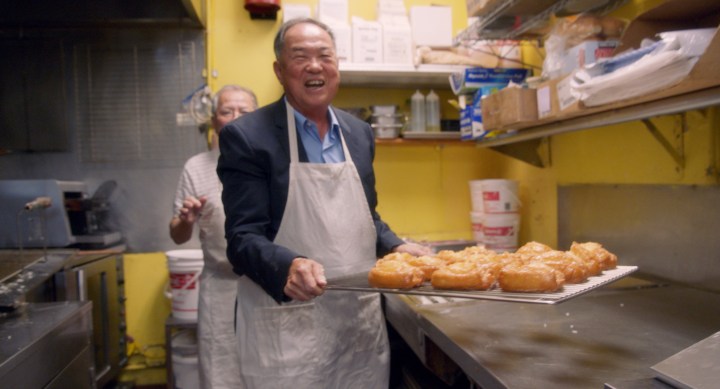
David Brancaccio on “The Donut King”

I clearly remember a Marketplace story pitch meeting from the roaring ’90s. A reporter was pushing what seemed an overbroad generalization that “most doughnut shops in Los Angeles were owned by Cambodian Americans,” that it would be interesting for our audience to learn why. Was the premise true? The reporter was curious. So was I, but I was concerned the proposal might have been built from some kind of stereotype.
What we found, using industry sources, was that by the late 1990s, 80% of the doughnut shops in California were indeed owned by people from Cambodia, mostly new refugees. And it wasn’t just California. In Texas, some estimates put the percentage of doughnut shops owned by Cambodians at 90%. We went ahead and assigned the story to the reporter.
So it was with great interest, all these years later, that I sat down and watched “The Donut King,” a 2020 film about Ted Ngoy, a former Cambodian military officer who turned to doughnut shops in California after fleeing the genocidal regime of the Khmer Rouge in his native country. Ngoy was able to grow Christy’s Donuts, named after his wife, into a chain of stores. He would later set up leasing arrangements that helped many other Cambodian Americans desperate for a firmer economic foothold to open their own doughnut shops. An entree to capitalism, American style. These mom-and-pops were able to collectively face down a publicly traded goliath, Dunkin’, at least for many years. Ngoy’s story does not end there. All I will say (in case you would like to watch without spoilers) is that director Alice Gu’s film takes some edgy turns.
One vein of gold the documentary follows involves the power of the social network, a term only later appropriated by the likes of Facebook and TikTok. For new immigrants fleeing murderous oppression, a network of friends, family or people you knew from a shared house of worship could provide what banks might not to a population that had not yet established American credit scores, collateral for loans, or who, as immigrants, faced discrimination by formal lenders.
The great text on this subject is “Immigrant Networks and Social Capital,” by Carl L. Bankston III, a sociologist at Tulane University. Bankston makes a distinction between what he calls “ethnic jobs,” which are occupations where you find many people of the same ethnic background because their social networks helped them find a particular kind of job, and “ethnic economies,” which all the dooughnut shops owned by Cambodian Americans nicely illustrate. The latter are, Bankston writes, “networks that create economic opportunities out of immigrant social relations, most notably entrepreneurship.”
I once attended a seminar led by a retired entrepreneur helping the Small Business Administration train newbies on how to refine their proposed ventures. This guy’s first order of business was helping budding entrepreneurs find an unmet need in the market. Perhaps, I don’t know, easier access to handy fried delicacies that fit in a pink box for hungry commuters in car-centric California. For this small business coach, the second order of business was how to find early–stage capital. “Where are you going to get your money? NOT your parents!” he would thunder, asking and answering his own question in a single salvo. To him, the right answer on seed money was to start with your own savings and then cast your net throughout your personal network to ask for money from people you trust and who trust you. For many new immigrants, that would often be funders linked by shared cultural ties.
— David
“The Donut King” is available to stream on Hulu with a subscription and to rent or buy elsewhere.
If you’ve had a chance to watch, please send your takeaways to extracredit@marketplace.org. We’ll feature some of those answers in an upcoming newsletter. (If you’re planning on watching soon, we recommend having a doughnut at the ready.)
There’s a lot happening in the world. Through it all, Marketplace is here for you.
You rely on Marketplace to break down the world’s events and tell you how it affects you in a fact-based, approachable way. We rely on your financial support to keep making that possible.
Your donation today powers the independent journalism that you rely on. For just $5/month, you can help sustain Marketplace so we can keep reporting on the things that matter to you.


















